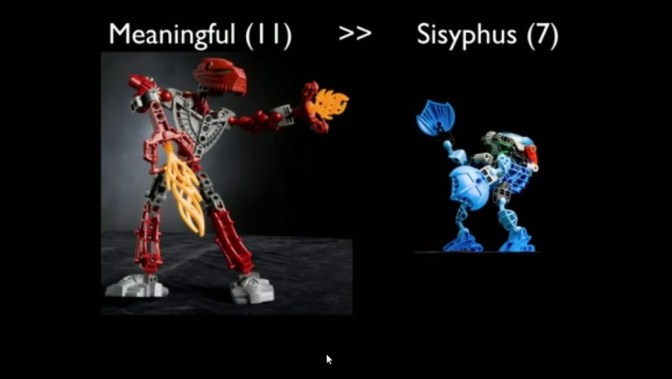In this TEDx talk, Dan Ariely discusses ‘What makes us feel good about our work’. It is a slightly longer talk (20+ mins) by TED standards in which he describes two interesting, eye-opening experiments that give some clues about our complex, nuanced attitude towards meaning in our work.
Dan Ariely is a professor of Psychology and Behavioral Economics teaching at Duke University, USA. He is an impressive academician with two PhD titles, one in psychology and another in business administration. He runs an interesting blog about his research in simple language at: DanAriely.com.
Here are some interesting excerpts from the video. This is what he says when people think of meaning or purpose in their work.
“People understand meaning is important, but they don’t understand the magnitude.”
He explains it wonderfully with reference to his experiment of building meaningful Lego and Sisyphus Lego.
Another gem that I found in this talk when he discusses effect of encouragement, acknowledgement on our work.
“Ignoring the effort of people is almost as bad as shredding their effort in front of their eyes.”
Please watch the video first before you read my notes about it below.
I am quite fascinated with this video and planning to use its essence somehow in my workshops with professionals. Both the experiments he describes, one about Lego models and the other about IKEA Furniture/Origami models.
The first experiment talks about money & meaning that we find in our work. I have this image etched in my mind for this talk about Meaningful work & Sisyphus Work –

When people had to dismantle their Lego models and create them repeatedly, they could do it only 7 times as opposed 11 times when it was meaningful for them. Although they thought that the difference world be just 7 Vs. 8. That’s why Dan Ariely says: People understand meaning is important, but they don’t understand the magnitude.
I liked that he explained it further with an example of a large software company in Seattle when an innovative big project was called off by the CEO after 2 years of hard work of 200 people, and how they were depressed when felt their efforts were thrashed. The CEO basically did not understand the importance of meaning. I have seen similar cases personally as well. And that perhaps explains why some bright, experienced professionals work for starts-ups at lesser salaries where they can find meaning in their work and know that their contribution is appreciated.
The ‘IKEA Effect’ is intriguing about positive motivation. When we feel that we have created or earned something with our own hard work, we tend to value it more. Obviously, it is not surprising. I tend to love all those little things that I make with my 6-year-old more than things that we buy. Even my 6-year-old loves the tiny projects that we make more than most of his toys that we have purchased. It is interesting to understand how much more value we add these as Dan Ariely concurred in his Origami models experiment.
Again, just like Barry Schwartz’s talk, Dan Ariely also mentions Adam Smith with reference to industrial revolution, especially division of labor. In a classic Adam Smith Vs. Karl Marx debate, he discusses Efficiency Vs. Meaning and that has really made me think about it long after I watched this video. It has left with an important question that would stay with me for a long time!
In this age of Knowledge Economy as opposed to the age of Industrial Revolution, is meaning more important than efficiency?
What do you think? Is ‘meaningful work‘ more of an individual choice? Can organizations, large corporates offer meaningful work without compromising on efficiency/productivity? How can you, as an individual contributor or middle level manager or senior executive bring more meaning in your organizational work?
I’d love to hear your thoughts….

One thought on “What makes us feel good about our work?”